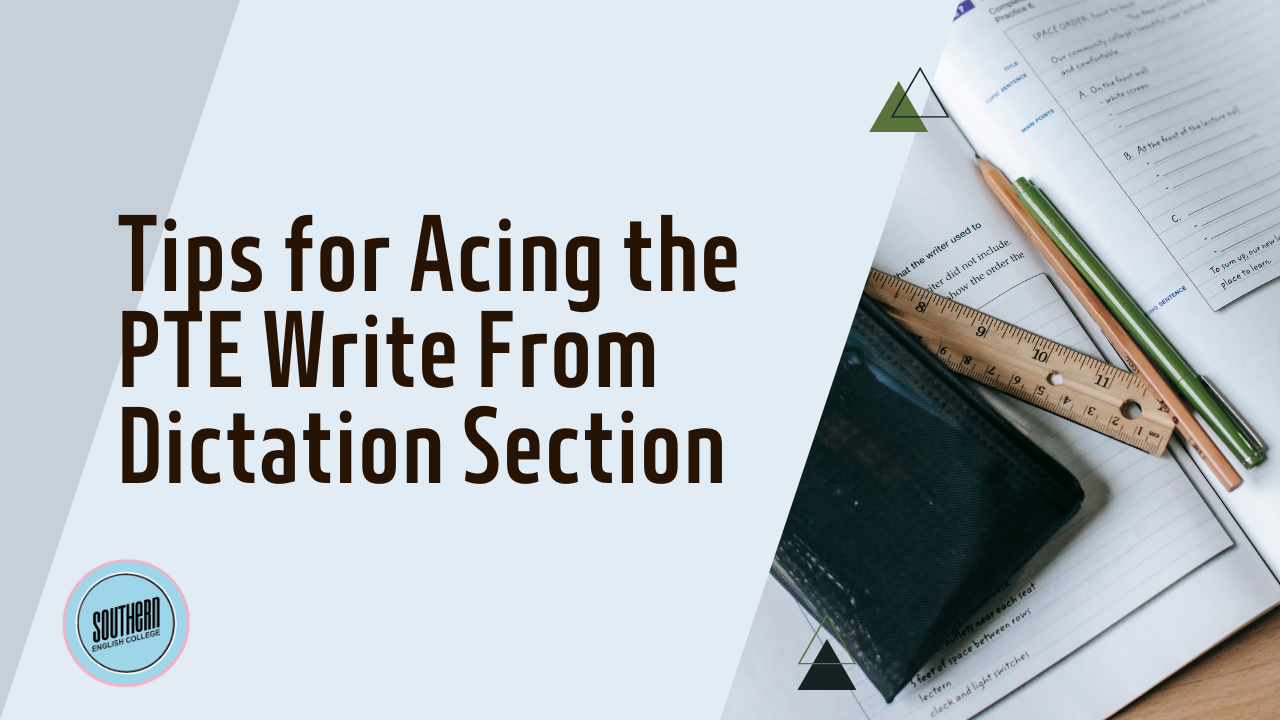
The Pearson Test of English Academic (PTE Exam) is an English proficiency exam taken by candidates who want to study abroad or work in a native English-speaking country. The PTE Exam, which lasts three hours, must be taken on a computer by the candidate. The exam is divided into three sections that test three different abilities: speaking and writing skills, reading skills, and listening skills. The exam results are available to candidates within 4-5 business days.
Have you noticed how we ask you to take notes but not to confuse this with taking dictation in our tips? Well, the PTE Write from dictation is an actual dictation question in PTE. In this article, we will share some proven PTE Write from dictation tips and tricks with you.
Challenges: PTE Listening Exam Section
The PTE Academic Examination is divided into three sections, each of which tests four aspects of English communication proficiency: speaking and writing, reading, and listening. The most challenging section is the Listening section, in which the examinee must listen to sentences spoken in foreign accents. So, the primary challenges of the PTE Listening section are as follows:
- Keeping the long sentences in mind
- Correcting the spelling
- Recognizing foreign accents
While these challenges are graded, remembering long sentences accurately is the most difficult. The next challenge is trying to understand long sentences spoken in foreign accents. The easiest is to get the spelling of the words correct. We’ve compiled the top eight tips to help you prepare for the write-from-dictation task in the PTE Academic Listening section.
What is the Write-From-Dictation task?
The Write-From-Dictation task is a listening section activity in which the examinee must slot listen to spoken sentences and record them in writing. The higher the score in the Write-From-Dictation task, the more precise the written sentence. The examinee must enter the written sentence into a response box at the bottom of the screen. The dictated sentence in the audio is limited to a single play, so the examinee must pay close attention.
How to Score in PTE Write From Dictation Scoring Pattern and Marking Structure
The scoring of Write From Dictation is primarily determined by the correct words that the candidate writes. All correct words receive one point, while incorrect or misspelt words receive zero.
If you’re looking for a unique way to express yourself, this is the place to be. If the candidate writes, “Your summary should be as clear and concise as possible”, they will get 0 for misspelling the word ‘possible’ as ‘posible’. And if the candidate correctly writes all of the words in the sentence, they receive a score for all of them.
PTE Write From Dictation scoring is done in such a way that the candidate is still scored even if they miss certain words of a sentence. If the candidate has written all or most of the keywords, they will receive points for those.
Take the sentence “Observers waited nervously and held their breath for the concert,” for example. If the candidate correctly writes the keywords ‘observers,’ ‘nervously,’ and ‘concert’ but misses a few less important words, the candidate has a good chance of scoring well.
PTE Write From Dictation marks is given for each word spoken in the sentence. The scoring criteria differ depending on the sentence structure and words used. Take a look at the sentence, “Undergraduate students may participate in specific stages within the programme.” Words like ‘undergraduate’ and ‘participate’ have more marks in this sentence than may and stages.
As a result, the length of a word in a sentence, as well as the difficulty level of spelling associated with length, ensures that the candidate receives more marks. Because incorrect words will not be marked or scored well, the candidate must understand that they are writing the word correctly.
How does the number of Write From Dictation marks in PTE affect the scores?
In the PTE Exam, the Write From Dictation section has 3 or 4 questions. The audio for each of these questions is separated by a few seconds. There is no time limit for answering the questions about writing from dictation.
Because the section requires the candidate to listen to the audio and write down the sentence as spoken, the scores for listening and writing are added to the candidate’s overall scoring card. The candidate will score higher on these components if they have strong listening and writing skills, a large vocabulary, and flawless spelling skills.
How to Score in PTE Write from Dictation: Tips and Strategies
#1. Improve Your Listening Ability
Listening to various English audio will help you improve your listening skills. Podcasts are more effective in enhancing listening ability because they are digital audio files with no visual cues to infer.
Listening to a podcast about your topic would be more beneficial because you would be more engaged.
#2. Get Plenty of Rest and Sleep
Do not overdo it and strain your brain. For full focus and attention while taking the exam, complete rest and a good amount of sleep are required. It is understandable that any candidate would be nervous before taking the exam, but this nervousness should not interfere with your performance on the actual exam day. Eat well, get plenty of rest, and be prepared.
#3. Take Mock Exams
Mock tests would help you prepare for your final exam. Mock test questions will also give you an idea of how the exam is run and where you stand in terms of scoring. The more you practise by taking mock tests, the better your listening and writing skills will become.
#4. Arrange the Words Correctly
You can easily become confused when trying to recall the correct order of words in sentences in your head. Arrange the sentence in your mind and then write it on the scratchpad while your mind is clear. You can type out the final answer once you are certain of it.
#5: There is no time limit
There are no restrictions on what can be written from dictation in PTE. This means the candidate can concentrate on one question at a time. You cannot afford to make the mistake of listening and writing at the same time, as this will cause you to miss out on words, affecting your overall marks and exam scoring.
This is one of the most common and serious errors people make when attempting to write from dictation. This is easily avoided if you only focus on one thing at a time. Listen to the audio first, paying close attention to each word. You can begin writing your response after you have completely comprehended the audio.
#6. Write First, Then Type
Although your typing speed may be the fastest, it is advised that you use the scratchpad to jot down what you heard on the audio. Once you’ve finished writing and rearranging the sentence, type out the final answer.
#7. Make Use of Scratchpad/Erasable Notepad
The scratchpad proves to be extremely useful for candidates taking the PTE exam. The scratchpad is intended for jotting down rough responses before typing the final version on the computer. You can read about it here. The scratchpad can be used to clear up any questions or doubts about the correct answer sequence.
#8. Shorten Words on the Scratchpad
There are no rules to follow while writing the answers on the scratchpad. As a result, the candidate can always shorten their responses as they see fit. For example, the word ‘developmental’ can be abbreviated as ‘devel-al,’ and the word ‘establishment’ can be abbreviated as ‘estb.’
Another useful trick is to listen to the pronunciation. There may be many words that you do not know how to spell. In such cases, you can examine the pronunciation of the word in question and break it down into smaller units. The word ‘correspondence,’ for example, can be broken down as ‘cor – us – pon – dense’. The word may not make much sense when broken down, but it will help you understand the actual word that was spoken.
#9 Check your spelling, grammar, and punctuation
Make sure to capitalise the first word of the sentence when typing the final answer in the space provided. In addition, the sentence should end with a full stop, question mark, or exclamation mark, depending on the answer. You should also double-check the grammar before submitting the final version. Spellings of the most common words should also be double-checked. While typing the answer, do not type the abbreviated version of a word.
#10 Go Over the Answers
It is critical to go over and review all of the answers. Review all of your typed answers before submitting the final version. The last-minute check can help you catch any minor errors you may have made. Examine the scratchpad and cross-check and verify the answers. Check that you haven’t left any words out of any sentences.
When you’ve finished checking and rechecking, submit the exam.
#11 One step at a time
In WFD, there is no time limit for answering the question. That simply means you can concentrate on one task at a time. One of the most common mistakes students make on the PTE exam is attempting to type and listen at the same time. The best thing to do here is to carefully listen to the audio and then proceed. When you carefully listen to the audio, it will imprint in your mind, and you will be able to properly write it down.
#12 Shorthand could be a great help here
If you know shorthand, you can write as the audio plays. It will assist you in capturing the exact sentence without wasting time. Once you’ve finished recording the audio, type the entire sentence in the final response box. Even if you don’t know shorthand, you can come up with your own abbreviation for some common words. Instead of writing ‘today,’ you could simply write ‘2day’. Similarly, you can create your own short-word vocabulary to capture the audio as it plays.
Conclusion
All of these strategies will help you score well on the Write from Dictation exercise in the PTE preparation. While implementing these strategies, you should also learn from experts the best way to pass the PTE exam questions.



